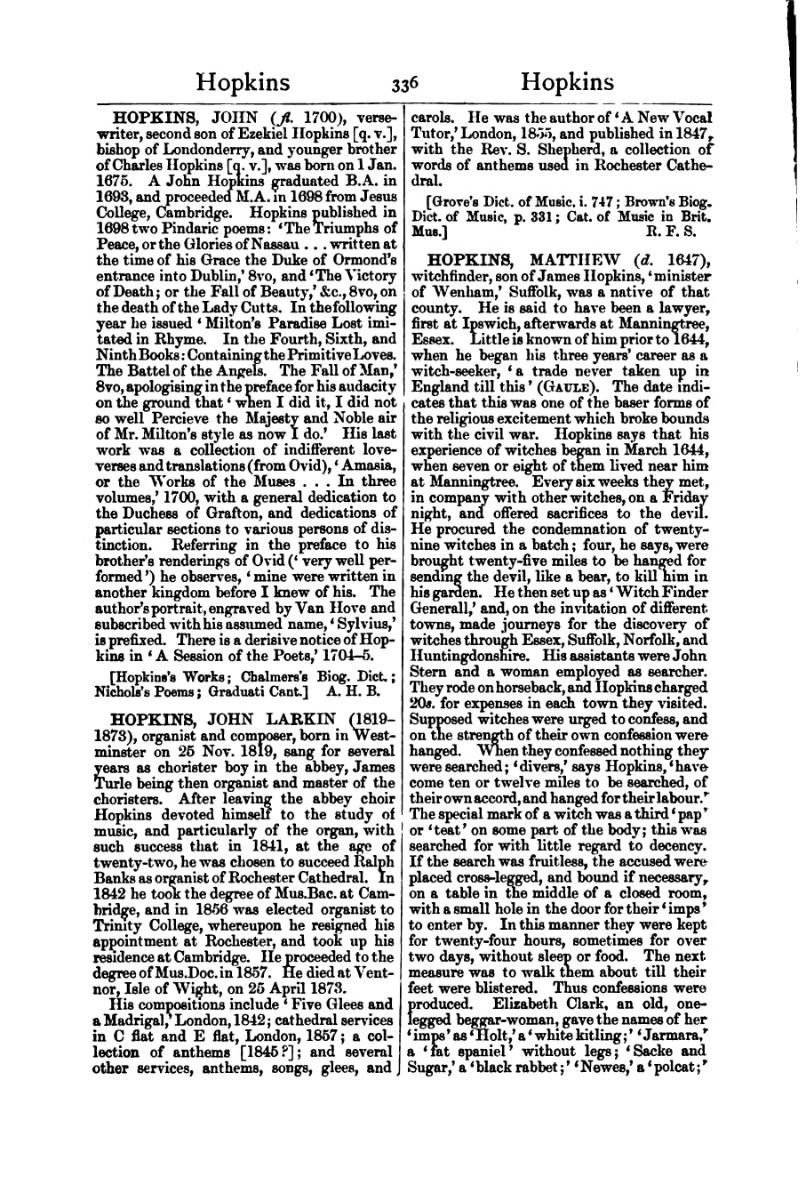HOPKINS, JOHN (fl. 1700), verse-writer, second son of Ezekiel Hopkins [q. v.], bishop of Londonderry, and younger brother of Charles Hopkins [q. v.], was born on 1 Jan. 1675. A John Hopkins graduated B.A. in 1693, and proceeded M.A. in 1698 from Jesus College, Cambridge. Hopkins published in 1698 two Pindaric poems: ‘The Triumphs of Peace, or the Glories of Nassau … written at the time of his Grace the Duke of Ormond's entrance into Dublin,’ 8vo, and ‘The Victory of Death; or the Fall of Beauty,’ &c., 8vo, on the death of the Lady Cutts. In the following year he issued ‘Milton's Paradise Lost imitated in Rhyme. In the Fourth, Sixth, and Ninth Books: Containing the Primitive Loves. The Battel of the Angels. The Fall of Man,’ 8vo, apologising in the preface for his audacity on the ground that ‘when I did it, I did not so well Percieve the Majesty and Noble air of Mr. Milton's style as now I do.’ His last work was a collection of indifferent love-verses and translations (from Ovid), ‘Amasia, or the Works of the Muses … In three volumes,’ 1700, with a general dedication to the Duchess of Grafton, and dedications of particular sections to various persons of distinction. Referring in the preface to his brother's renderings of Ovid (‘very well performed’) he observes, ‘mine were written in another kingdom before I knew of his. The author's portrait, engraved by Van Hove and subscribed with his assumed name, ‘Sylvius,’ is prefixed. There is a derisive notice of Hopkins in ‘A Session of the Poets,’ 1704–5.
[Hopkins's Works; Chalmers's Biog. Dict.; Nichols's Poems; Graduati Cant.]
HOPKINS, JOHN LARKIN (1819–1873), organist and composer, born in Westminster on 25 Nov. 1819, sang for several years as chorister boy in the abbey, James Turle being then organist and master of the choristers. After leaving the abbey choir Hopkins devoted himself to the study of music, and particularly of the organ, with such success that in 1841, at the age of twenty-two, he was chosen to succeed Ralph Banks as organist of Rochester Cathedral. In 1842 he took the degree of Mus. Bac. at Cambridge, and in 1856 was elected organist to Trinity College, whereupon he resigned his appointment at Rochester, and took up his residence at Cambridge. He proceeded to the degree of Mus. Doc. in 1857. He died at Ventnor, Isle of Wight, on 25 April 1873.
His compositions include ‘Five Glees and a Madrigal,’ London, 1842; cathedral services in C flat and E flat, London, 1857; a collection of anthems [1845?]; and several other services, anthems, songs, glees, and carols. He was the author of ‘A New Vocal Tutor,’ London, 1855, and published in 1847, with the Rev. S. Shepherd, a collection of words of anthems used in Rochester Cathedral.
[Grove's Dict. of Music, i. 747; Brown's Biog. Dict. of Music, p. 331; Cat. of Music in Brit. Mus.]
HOPKINS, MATTHEW (d. 1647), witchfinder, son of James Hopkins, ‘minister of Wenham,’ Suffolk, was a native of that county. He is said to have been a lawyer, first at Ipswich, afterwards at Manningtree, Essex. Little is known of him prior to 1644, when he began his three years' career as a witch-seeker, ‘a trade never taken up in England till this’ (Gaule). The date indicates that this was one of the baser forms of the religious excitement which broke bounds with the civil war. Hopkins says that his experience of witches began in March 1644, when seven or eight of them lived near him at Manningtree. Every six weeks they met, in company with other witches, on a Friday night, and offered sacrifices to the devil. He procured the condemnation of twenty-nine witches in a batch; four, he says, were brought twenty-five miles to be hanged for sending the devil, like a bear, to kill him in his garden. He then set up as ‘Witch Finder Generall,’ and, on the invitation of different towns, made journeys for the discovery of witches through Essex, Suffolk, Norfolk, and Huntingdonshire. His assistants were John Stern and a woman employed as searcher. They rode on horseback, and Hopkins charged 20s. for expenses in each town they visited. Supposed witches were urged to confess, and on the strength of their own confession were hanged. When they confessed nothing they were searched; ‘divers,’ says Hopkins, ‘have come ten or twelve miles to be searched, of their own accord, and hanged for their labour.’ The special mark of a witch was a third ‘pap’ or ‘teat’ on some part of the body; this was searched for with little regard to decency. If the search was fruitless, the accused were placed cross-legged, and bound if necessary, on a table in the middle of a closed room, with a small hole in the door for their ‘imps’ to enter by. In this manner they were kept for twenty-four hours, sometimes for over two days, without sleep or food. The next measure was to walk them about till their feet were blistered. Thus confessions were produced. Elizabeth Clark, an old, one-legged beggar-woman, gave the names of her ‘imps’ as ‘Holt,’ a ‘white kitling;’ ‘Jarmara,’ a ‘fat spaniel’ without legs; ‘Sacke and Sugar,’ a ‘black rabbet;’ ‘Newes,’ a ‘polcat;’
